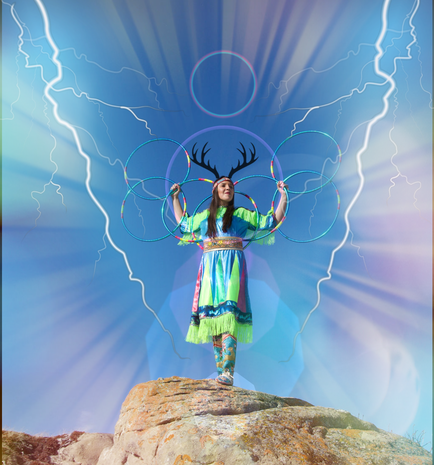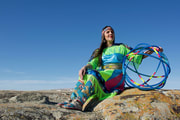|
Have you ever thought about the power of a name? I grew up in Slave Lake, Alberta, a name that comes from the Slavey people a name of European origin that is derogatory, or at best misappropriation. The name 'Slavey' refers to people who call themselves Denѐ, which translates simply to 'people'. Their are stories like this all over Turtle Island...
The name my parents gave me 'Sandra' means defender of man or helper of humanity, which is actually very appropriate if you know me. My last name Lamouche, meaning 'the fly' was given to my great grandfather because he was a hard worker, it was a nickname. Later, the missionaries told him it was because he was so insignificant, like a fly. My Blackfoot name, Itamspiakii, translates to Happy Dancing Woman and comes from the deer family. This name has many meanings- It is a reminder to be happy and think positive. It is motivation and encouragement to keep dancing, to not give up. It carries the meaning of what a woman is to Indigenous peoples, including culture carrier and life giver. The deer is a graceful and gentle creature, which I try to embody in my dance and everyday life, this also connects me to this land, and to the natural world. This name carries so much guidance, wisdom and resilience. At one time all over North America we only had our Indigenous names, which were not only spiritual and sacred, but they were also inspiring and empowering. Names could be passed on from your relatives and ancestors, with the expectation that you live up to that name and the greatness and achievements of the person who carried the name before you, as is the case with my two sons. Your name could change over your lifetime, therefore your identity could change. Through your achievements and actions could earn an appropriate name. In essence, the family or situation you were born into did not predict your path in life, you could persevere and overcome, you could change your life and your resilience was honored. The name of the first hoop dancer in the Ojibway story is 'Pukawiss' which means the disowned one, they say nobody remembers his real name. Despite being disowned Pukawiss creates the hoop dance and makes a name for himself (no pun intended) as a renowned artist, storyteller and performer. His actions speak louder than his name and his legacy remains a powerful part of Indigenous identity to this day. Indigenous names are an important part of building resilience. "Resilience is the process of adapting well in the face of adversity, trauma, tragedy, threats or significant sources of stress — such as family and relationship problems, serious health problems or workplace and financial stressors. It means "bouncing back" from difficult experiences (source)". In Canada, Indigenous peoples were systematically given European names through assimilation policies, in some cases, such as residential schools Indigenous people were sometimes given numbers to replace their names. Reclaiming Indigenous names does not only build resilience it also a step towards reconciliation. As the Truth and Reconciliation Call to Action #17 states: "We call upon all levels of government to enable residential school Survivors and their families to reclaim names changed by the residential school system by waiving administrative costs for a period of five years for the name-change process and the revision of official identity documents, such as birth certificates, passports, driver’s licenses, health cards, status cards, and social insurance numbers" Indigenous peoples are reclaiming Indigenous names all over, from personal names to community names and names of nations as an important act of reconciliation and resilience, and also an important way to take back our power as people and nations, for healing, self-determination and sovereignty.
0 Comments
Your comment will be posted after it is approved.
Leave a Reply. |
Nehiawsko Pikiskwew'Cree Woman Speaking' is a space to share my voice. My goal is to spread awareness and share wisdom as I learn and grow as a dancer, choreographer, and woman. My passion is to show the healing power of dance and culture. I love learning from elders, experience, and research and being able to synthesize Native and non-Native ways of knowing! Archives
November 2023
Categories
All
|

